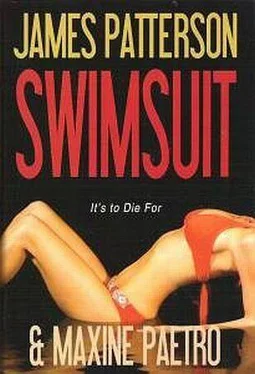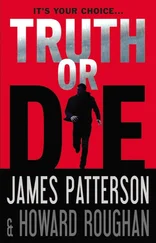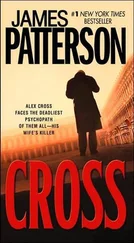A collection of single frames taken from videos of women who'd been tied up, tortured, decapitated, flickered across the computer screen.
I could hardly absorb what I was seeing as Van der Heuvel flashed through the pictures, smoking his cigarette, providing blithe commentary for a slide show of absolute and, until now, unimaginable horror.
I felt light-headed. I was starting to feel that Van der Heuvel and Henri were the same person. I hated them equally. I wanted to kill Van der Heuvel, the worthless shit, and I thought I could even get away with it.
But I needed him to lead me to Henri.
“At first I didn't know that the murders were real,” he was saying, “but when Henri began to cut off heads, then, of course, I knew.? In the last year, he began writing his own scripts. Getting a little too drunk with attention. Getting too greedy.
“He was dangerous. And he knew me and Gina, so there was no easy way to end it.”
Van der Heuvel exhaled a plume of smoke and went on.
“Last week, Gina planned to either pay Henri off or make him disappear. Obviously, she misjudged him. She never told me how she contacted him, so once again, this is the truth, Mr. Hawkins, I have no idea where Henri is. None at all.”
“Horst Werner signs Henri's paychecks, doesn't he?” I said. “Tell me how to find Werner.”
Van der Heuvel stubbed out his cigarette. His delight was gone. He spoke to me with dead seriousness, emphasizing every word.
“Mr. Hawkins, Horst Werner is the last person you ever want to meet. In your case in particular. He will not like Henri's book. Take my meaning. Don't let it out of your hands. Scrub your computer. Burn your tapes. Never mention the Alliance or its members to anyone. This advice is worth your life.”
It was too late to scrub my hard drive. I'd sent my transcripts of the Henri interviews and the outline of the book to Zagami in New York. The transcripts had been photocopied and passed around to editors and Raven-Wofford's outside law firm. The names of the Alliance members were all over the manuscript. I had planned to change the names, as I'd promised Henri, in the final draft.
I bulled ahead. “If Werner helps me, I'll help him.”
“You have the brain of a brick, Hawkins. Listen to what I'm telling you. Listen. Horst Werner is a powerful man with long arms and steel fists. He can find you wherever you are. Do you hear me, Hawkins? Don't be afraid of Henri, our little windup toy.
“Be afraid of Horst Werner.”
Van Der Heuvel abruptly called our meeting to an end, dismissed me, saying that he had a flight to catch.
My skull felt like a pressure cooker about to blow. The threat against me had been doubled, a war on two fronts: If I didn't write the book, Henri would kill me. If I did write the book, Werner would kill me.
I still had to find Henri, and now I had to stop Van der Heuvel from telling Horst Werner about Henri's book, and about me.
I dug Henri's Ruger out of my computer case and aimed it at the Dutchman. My voice was hoarse from the stress of unexpressed fear and fury when I said, “You remember I said I didn't care about you and the Alliance? I've changed my mind. I care a lot.”
Van der Heuvel looked at me with scorn.
“Mr. Hawkins, if you shoot me, you will be in a prison for the rest of your life. Henri will still be alive and living in luxury somewhere in the world.”
“Take off your coat,” I said, hefting the gun in my hand. “And everything else.”
“What is the point of this, Hawkins?”
“I like to watch,” I said. “Now shut up. Take off all your clothes. The shirt, the shoes, the pants, every stitch you have on.”
“You are really a fool,” he said, obeying me. “What have you got on me? Some pornography on my computer? This is Amsterdam. We are not prudes like your citizens of the United States. You can't tie me to any of it. Did you see me in any of those videos? I don't think so.”
I stood with the gun clasped in both my hands, leveled at Van der Heuvel, and when he was naked, I told him to grab the wall. Then I whacked him on the back of his head with the gun butt, the same treatment Henri had given me.
Leaving him unconscious on the floor, I lifted Van der Heuvel's tie from the pile of clothes on the chair and used it to secure his wrists tightly behind his back.
His computer was connected to the Internet, and I worked fast, attaching the Henri Benoit videos to e-mails that I addressed to myself. What else?
There was a box of marking pens on his desk, and I dropped one of them into my coat pocket.
Then I walked through Van der Heuvel's immaculate, full-floor flat. The man was house-proud. He had beautiful things. Expensive books. Drawings. Photographs. His closet was like a clothes museum. It was sickening that a man this base, this vile, could have such a carefree and luxurious life.
I went to Van der Heuvel's magazine-quality kitchen and turned on the gas burners on his stove.
I set dish towels and two-hundred-dollar ties on fire, and as flames reached for the ceiling, the overhead sprinkler system opened.
An alarm rang out in the stairwell, and I was sure another alarm was ringing in a firehouse nearby.
As water surged across the fine wooden floors, I returned to the main room, packed away the computers, slinging both mine and Van der Heuvel's over my shoulder.
Then I slapped Van der Heuvel's face, yelled his name, jerked him to his feet. “Up! Get up. Now!” I yelled.
I ignored his questions as I marched him down the stairs to the street. Smoke billowed from the windows and, as I'd hoped, a thick crowd of witnesses had congregated around the house: men and women in business attire, old people and children on bicycles that the city provided free to residents.
I sat Van der Heuvel down on the curb and uncapped the marking pen. I wrote on his forehead, “Murderer.”
He called out to people in the crowd, his voice shrill. He was pleading, but the only word I could understand was “police.” Cell phones came out and numbers were punched.
Soon sirens screamed, and as they came closer I wanted to howl along with them. But I kept Henri's gun trained on Van der Heuvel and waited for the police to arrive.
When they finally did, I set down the Ruger on the sidewalk, and I pointed at Van der Heuvel's forehead.
SWITZERLAND.
Two cops were in the front seat, and I sat in the back of a car speeding toward Wengen, a toylike Alpine town in the shadow of the Eiger. Despite the ban on cars in this idyllic ski resort, our armored vehicle twisted around the narrow and icy roads. I clenched the armrest, leaned forward, and stared straight ahead. I wasn't afraid that the car would sail over a guardrail. I was afraid that we wouldn't get to Horst Werner in time.
Van der Heuvel's computer had yielded his contact list, and in addition to the complete playlist of Henri Benoit's videos, I'd turned over my transcripts of Henri's confessions in the trailer. I'd explained to the police the connection between Henri Benoit, serial killer for hire, and the people who paid him.
The cops were elated.
Henri's trail of victims, dozens of horrific killings in Europe and America and Asia, had been linked only since the recent murders of the two young women in Barbados. Now the Swiss police were optimistic that with the right kind of pressure, Horst Werner would give Henri up.
As we sped toward Werner's villa, law enforcement agents were moving in on members of the Alliance in countries around the world. These should have been triumphant hours for me, but I was in a state of raw panic.
I'd made calls to friends, but there were no phones where Amanda was staying. I didn't know if it would be hours or days before I would know if she was safe. And although Van der Heuvel had referred to Henri as a toy, I had more evidence than before of his ruthlessness, his resourcefulness, his lust for revenge. And I finally understood why Henri had drafted me to write his book. He wanted the Alliance, his puppeteers, to be caught so that he could be free of them, to change his identity again and lead his own life.
Читать дальше












